Films with theme "Samurai films", sorted by name
 , 1h29
, 1h29Directed by Toshiya Fujita
Genres Drama, Thriller, Action
Themes Seafaring films, Sports films, Transport films, Martial arts films, Samurai films
Actors Meiko Kaji, Jūzō Itami, Kazuko Yoshiyuki, Yoshio Harada, Toru Abe, Koji Nanbara
Sayo, condamnée à la prison à vie, pour avoir tué l'assassin de son mari et de son fils, ne vit plus que pour une chose : donner naissance à l'instrument de sa vengeance. Elle décède malheureusement en couches en donnant le jour à une fille, Yuki, qui, suivant sa destinée, deviendra la redoutable Lady Snowblood, aux charmes aussi affûtés que le sabre !
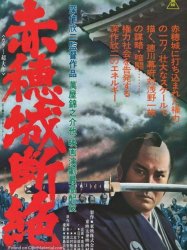
The Fall of Ako Castle (1978)
, 2h38Directed by Kinji Fukasaku
Origin Japon
Genres Drama, Action, Historical
Themes Seafaring films, Sports films, Transport films, Martial arts films, Samurai films
Actors Kinnosuke Nakamura, Sonny Chiba, Tetsurō Tanba, Tsunehiko Watase, Toshiro Mifune, Masaomi Kondō
Le film retrace l'histoire des 47 rōnin.

Throne of Blood (1957)
, 1h45Directed by Akira Kurosawa
Origin Japon
Genres Drama, Historical
Themes Seafaring films, Sports films, Théâtre, Transport films, Martial arts films, Samurai films, Political films, Films based on plays, Films based on works by William Shakespeare, Films about royalty
Actors Toshiro Mifune, Isuzu Yamada, Takashi Shimura, Minoru Chiaki, Akira Kubo, Kokuten Kōdō
Generals Miki and Washizu are Samurai commanders under a local lord, Lord Tsuzuki, who reigns in the castle of the Spider's Web Forest. After defeating the lord's enemies in battle, they return to Tsuzuki's castle. On their way through the thick forest surrounding the castle, they meet a spirit, who foretells their future. The spirit tells them that today Washizu will be named Lord of the Northern Garrison and Miki will now be commander of the first fortress. She then foretells that Washizu will eventually become Lord of Spiderweb Castle, and finally she tells Miki that his son will also become lord of the castle.
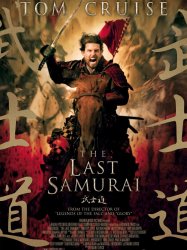
The Last Samurai (2003)
, 2h34Directed by Edward Zwick
Origin USA
Genres Drama, War, Action, Adventure, Historical
Themes Seafaring films, Sports films, Transport films, Martial arts films, Samurai films
Actors Tom Cruise, Timothy Spall, Ken Watanabe, Chad Lindberg, Tony Goldwyn, Hiroyuki Sanada
In 1876, U.S. Army captain Civil War veteran Nathan Algren is traumatized by his participation in atrocities during the Indian Wars, and has become an embittered alcoholic. Algren is approached by his former commanding officer, Colonel Bagley, on behalf of Japanese businessman Omura, who wishes to hire distinguished U.S. soldiers to train the Imperial Japanese Army to suppress a samurai rebellion, led by Katsumoto Moritsugu. In exchange, Japan would ratify a lucrative trade agreement that would grant the U.S. exclusive rights to supply arms to the Japanese government. Although Algren despises Bagley for having ordered atrocities during the Indian wars, he accepts the job for the money and sails to Japan. Most of the soldiers being trained are little more than inexperienced peasants and farmers.The training is interrupted when the samurai rebels attack a railroad owned by Omura; Bagley orders the regiment to mobilize, overruling Algren's objection that the soldiers are not ready. Algren is proved correct: during a battle in a foggy forest in Yoshino Province, the undisciplined and intimidated soldiers panic and are quickly routed by the samurai horsemen. Algren kills several samurai with his revolver and saber but is eventually knocked from his horse. Algren desperately fights using a spear tipped flagstaff with a flag of a white tiger until he collapses from complete exhaustion. As he is about to be vanquished, he kills his would-be executioner with the staff's spear tip. His ferocity and refusal to surrender, as well as the image of the white tiger on the flag he is fighting with, reminds Katsumoto of a recurring dream. As a result, Algren is spared and taken captive to the rebels' village in the mountains.
 , 2h1
, 2h1Directed by Tomu Uchida
Origin Japon
Genres Drama, Action, Historical
Themes Samurai films
Actors Kinnosuke Nakamura, Chiezō Kataoka, Ken Takakura, Isao Kimura, Wakaba Irie, Chieko Naniwa
Cinquième volet de la série de films consacrés au légendaire samouraï Miyamoto Musashi, réalisés par Tomu Uchida

Yojimbo (1961)
, 1h50Directed by Akira Kurosawa
Origin Japon
Genres Drama, Thriller, Action, Adventure
Themes Seafaring films, Sports films, Transport films, Martial arts films, Samurai films
Actors Toshiro Mifune, Tatsuya Nakadai, Yōko Tsukasa, Isuzu Yamada, Takashi Shimura, Daisuke Katō
It is 1860, and the era of the Tokugawa shogunate is coming to a close. A rōnin, or masterless samurai, wanders into a small town divided by a gang war between two gangsters, Seibei and Ushitora. Ushitora used to be Seibei's right-hand man, until Seibei decided that his son Yoichiro would succeed him. Tazaemon, the silk merchant and mayor, backs Seibei, while Tokuemon the sake brewer is allied with Ushitora. Gonji, the owner of an inn, advises the stranger to leave while he can, but after sizing up the situation, the rōnin tells Gonji that the town would be better off with both sides dead, and that he intends to stay.

Taira Clan Saga (1955)
, 1h48Directed by Kenji Mizoguchi
Origin Japon
Genres Drama, Adventure, Historical
Themes Seafaring films, Sports films, Transport films, Martial arts films, Samurai films
Actors Ichikawa Raizō VIII, Michiyo Kogure, Koreya Senda, Eijirō Yanagi, Akitake Kōno, Tamao Nakamura
Japon, XII siècle, moines et nobles s'opposent. Le clan Taïra, dirigé par Tadamori, a du mal à être considéré à sa juste valeur par la cour. Le fils de Tadamori, Kiyomori, apprend qu'il est peut-être en réalité le fils de l'ancien empereur, qui était l'amant de sa mère, une courtisane.
 , 1h36
, 1h36Directed by Daisuke Itō
Origin Japon
Genres Drama, Action
Themes Seafaring films, Sports films, Transport films, Martial arts films, Samurai films, Yakuza films, Political films, Gangster films
Actors Denjirō Ōkōchi, Ranko Sawa
The three films focus on the travels of the kindly yakuza boss Kunisada Chūji. The existing print begins with Chuji on the road, fleeing the law while taking care of Kantaro, the son of a dead friend. He leaves Kantaro with Kabe Yasuemon, an honorable local boss, but is shocked to find out that his own men have been committing robberies using his own name. Angry, Chuji hits the road and eventually settles in another town, assuming another name and working as a clerk for a sake brewery. Okuma, the daughter of the brewer, falls in love with Chuji, but he ignores her. When he saves her brother from trouble with the Otozo gang, his identity is revealed and the police close in. Okume kills herself and Chuji flees, but the palsy he had been suffering from worsens and he is finally caught. His henchmen, however, succeed in rescuing him and bring him back to his home village. Unable to walk and confined to bed, Chuji is hidden in a storehouse. His woman, Oshina, discovers that one of his men has betrayed him, but it is too late. Despite the valiant efforts of his men to hold off the police, Chuji is finally arrested by the authorities.

Bloody Spear at Mount Fuji (1955)
, 1h34Directed by Tomu Uchida
Origin Japon
Genres Drama, Adventure
Themes Seafaring films, Politique, Sports films, Transport films, Martial arts films, Samurai films, Political films
Actors Chiezō Kataoka, Ryūnosuke Tsukigata, Daisuke Katō, Eitarō Shindō, Atsushi Watanabe, Harue Akagi
The samurai Sakawa Kojūrō is on the road to Edo with his two servants Genta and Genpachi. Kojūrō is a kindly master, but his character totally changes when he consumes alcohol. On the road, they encounter many different people: a traveling singer with her child, a father taking his daughter Otane to be sold into prostitution, a pilgrim, a policeman searching for a notorious thief, and Tōzaburō, the suspicious man the officer has his eyes on. Genpachi, the spear carrier, is also followed by an orphaned boy named Jirō who wants to be a samurai. When Kojūrō and Genpachi inadvertently capture the thief—who was the pilgrim in disguise—Kojūrō is disgusted when the authorities praise him and not his servant, even though Genpachi probably contributed more. He is also upset that he does not have the money to save Otane from being sold. In the end it is Tōzaburō who saves Otane, using the money he saved to rescue his own daughter, but decided to use for Otane after finding out his daughter had died. Depressed, Kojūrō takes Genta out drinking, despite the protests of the latter. When a band of boisterous samurai complain of Kojūrō drinking with someone of lower birth, Kojūrō gets upset. The samurai pull their swords and kill both the servant and his master. Genpachi arrives too late, but in a fury kills all the samurai with the spear. Authorities do not charge him with a crime, so he heads home carrying the ashes of Kojūrō and Genta. When Jirō tries to follow him, he shoos him off, telling him never to become a samurai.

Sword of the Beast (1965)
, 1h25Directed by Hideo Gosha
Origin Japon
Genres Drama, Action
Themes Seafaring films, Sports films, Transport films, Martial arts films, Samurai films
Actors Mikijirō Hira, Kunie Tanaka, Eijirō Tōno, Takeshi Katō, Gō Katō, Shima Iwashita
Gennosuke is a rebel samurai on the run, having fled his clan after assassinating a counselor. The daughter of the counselor, Misa, and her fiance, Daizaburo, pursue Gennosuke along with other samurai from Gennosuke's clan despite Gennosuke's obvious superiority as a warrior. A series of flashbacks reveals that Gennosuke was manipulated into committing the treason by one of the clan's higher-ranking samurai, who led Gennosuke to believe that the counselor's death would result in modern reforms to the clan and in Gennosuke's promotion to a full-fledged retainer, instead of a lowly foot soldier. In fact, the ranking samurai simply wanted the counselor killed so that he could succeed to the position himself. He had used Gennosuke to do the "dirty work", and then abandoned Gennosuke to face the consequences of the crime.
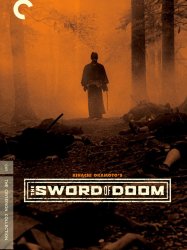
The Sword of Doom (1966)
, 1h59Directed by Kihachi Okamoto
Origin Japon
Genres Drama, Action
Themes Seafaring films, Sports films, Transport films, Martial arts films, Samurai films
Actors Tatsuya Nakadai, Yūzō Kayama, Michiyo Aratama, Toshiro Mifune, Ryosuke Kagawa, Kei Satō
The story follows the life of Ryunosuke Tsukue (Tatsuya Nakadai), an amoral samurai and a master swordsman with an unorthodox style. Ryunosuke is first seen when he kills an elderly Buddhist pilgrim who he finds praying for death. He appears to have no feeling. Later, he kills an opponent in self-defense in a fencing competition that was intended to be non-lethal, but became a duel after he coerced his opponent's wife to have sex with him in exchange for throwing the match and allowing her husband to win. His opponent finds out about the affair prior to the match, and is shown giving his wife a notice of divorce. His rage at Ryunosuke during the match causes him to take an illegal lunging attack after the judge proclaims a draw, and Ryunosuke, the better swordsman, parries and kills him with one stroke of his bokken. Ryunosuke flees town after killing the man, and cuts down many of the dead opponent's clansmen who attack him as he is leaving. His opponent's ex-wife asks to go along with him. To make a living, Ryunosuke joins the Shinsengumi, a sort of semi-official police force made up of rōnin that supports the Tokugawa shogunate through murder and assassinations.
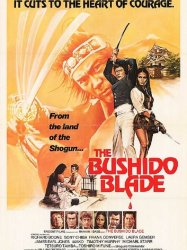
The Bushido Blade (1981)
, 1h44Genres Drama, Action, Historical
Themes Seafaring films, Sports films, Transport films, Martial arts films, Samurai films
Actors Sonny Chiba, Richard Boone, Frank Converse, Laura Gemser, James Earl Jones, Mako Iwamatsu
The basic plot concept bears a strong similarity to the earlier movie Red Sun (1971), also featuring Toshiro Mifune.
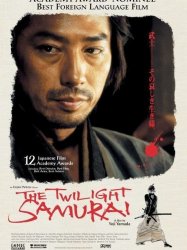
The Twilight Samurai (2002)
, 2h9Directed by Yōji Yamada
Origin Japon
Genres Drama, Action, Historical, Romance
Themes Seafaring films, Sports films, Transport films, Martial arts films, Samurai films
Actors Hiroyuki Sanada, Rie Miyazawa, Nenji Kobayashi, Ren Osugi, Mitsuru Fukikoshi, Miki Hirano
At the start of the film, the main character, Iguchi Seibei, becomes a widower when his wife succumbs to tuberculosis. His wife receives a grand funeral, more than what a low-ranking samurai such as Seibei could afford. Seibei works in the grain warehouse, accounting for stores inventory for the samurai clan. His samurai colleagues mock him behind his back with the nickname Tasogare (Twilight). When evening approaches, Seibei rushes home to look after his senile elderly mother and two young daughters, Kayano and Ito, instead of bonding with his supervisor and other samurai colleagues over customary nights of dinner, geisha entertainment, and sake drinking. Even though he is a samurai, Seibei neglects his appearance, failing to bathe and being shabbily dressed. The well-being of his young daughters and medicine for his mother take priority over new clothes or the monthly bath fee and his daughters say they are both happy, even without a mother.

Shogun's Samurai (1978)
, 2h10Directed by Kinji Fukasaku
Origin Japon
Genres Drama, Action, Adventure, Historical
Themes Seafaring films, Sports films, Transport films, Martial arts films, Samurai films
Actors Sonny Chiba, Tetsurō Tanba, Kinnosuke Nakamura, Hiroki Matsukata, Hiroyuki Sanada, Teruhiko Saigō
À la mort du second Shogun Tokugawa, les rivalités apparaissent pour sa succession. Le fils ainé du shogun, Iemitsu Tokugawa est laid et bégaie et semble manquer de charisme pour assumer cette tâche. La mère de celui, aidée du chancelier Doi, semble lui préférer son frère cadet Tadanaga. Mais le maître d'armes du Shogun, Tajima Yagyu, ainsi que plusieurs courtisans soutiennent Iemitsu. Chacun des camps parvient à convaincre son protégé de lutter pour succéder au Shogun. Enfin, les courtisans de l'Empereur cherchent à restaurer l'autorité de ce dernier. Les deux frères finissent donc par s'opposer dans une guerre mêlant batailles, intrigues et trahisons.

13 Assassins (1963)
, 2h5Directed by Eiichi Kudō
Origin Japon
Genres Drama, Action, Adventure, Historical
Themes Samurai films
Actors Chiezō Kataoka, Kō Nishimura, Ryōhei Uchida, Kanjūrō Arashi, Sumiko Fuji, Kōtarō Satomi
À la suite d’un ordre secret émanant d’un haut dignitaire du shogunat Tokugawa, 13 hommes ont un objectif commun : assassiner Matsudaira Nariaki, le daimyō du clan Akashi, un homme sanguinaire et despotique, devenu incontrôlable. Ils ont soixante jours pour réussir cette mission suicidaire…
 Connection
Connection